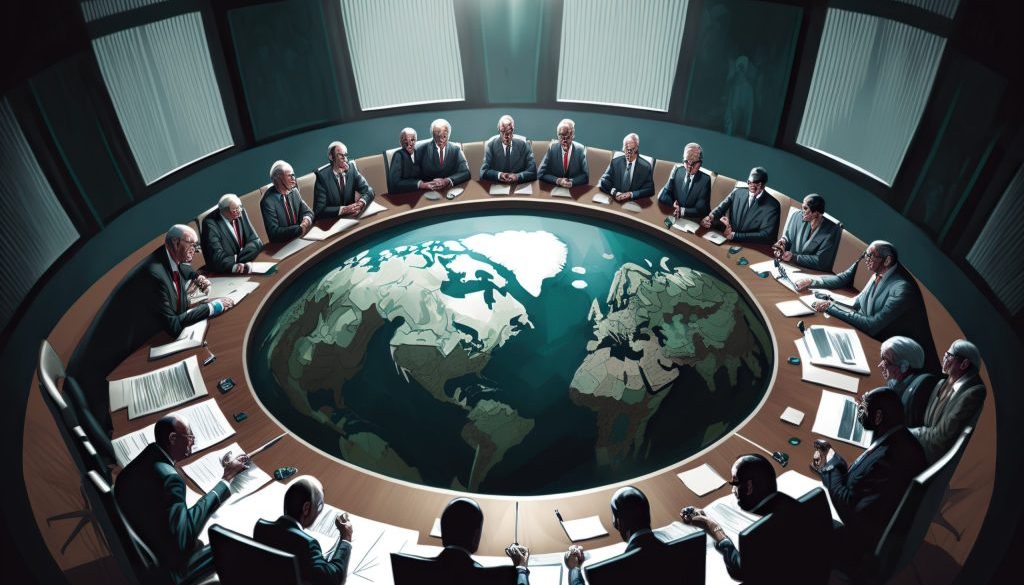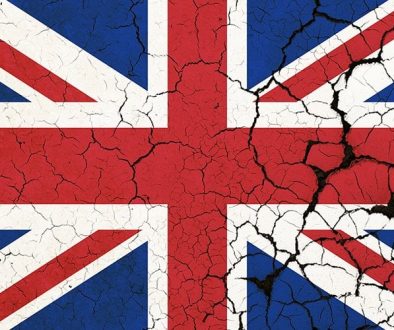The Deep State Revelations CERCLE
People like Dominic Cummings, chief advisor to former UK Prime Minister Boris Johnson, have a habit of revealing things we’re not supposed to know about how government operates. They often expose the motives and acts of what many these days call the deep state.
One of the most reasonable definitions of the “deep state” was offered by US defence analyst-turned-writer Mike Lofgren in his 2014 essay “Anatomy of the Deep State“:
[T]here is another government concealed behind the one that is visible[.] [It is] a hybrid entity of public and private institutions ruling the country according to consistent patterns in season and out.
The oft-inconvenient comments about that deep state, when uttered by the likes of Cummings, either go unreported by the legacy media or the disclosures are spun to misdirect public attention.
That’s because the job of the legacy media and its newer iteration, the Mainstream Alternative Media (MAM), is to maintain the public’s faith in the Establishment and its state—not to prompt us to question it.
Let’s consider the revealing remarks Dominic Cummings made in December 2024 (we’ll insert the names of the current incumbents):
So if you think of two roles, right, the Foreign Secretary [David Lammy] of Great Britain and the private secretary in the PM’s office responsible for foreign affairs [Ailsa Terry], an official whose name has never been in the newspapers, that person [Terry] was, like, ten times more powerful and important than the [foreign] secretary of state [Lammy]. This is something which, I think, people just don’t really realise. [. . .] It’s part of how the whole system has become fake. So, you have fake meritocracy, fake responsibility, and then fake cabinet government. [. . .] [I]t’s all nonsense. The cabinet is just like a staged theatre.
It may come as a relief to many that David Lammy is more window dressing than decision-maker. But that fact does prompt us to ask why, if unelected bureaucrats are running everything behind the scenes, we bother to engage in the political charade at all. Moreover, whom do the bureaucrats serve? And how do we challenge the power of those who really exercise it if they are not the politicians we elect to represent us?
Cummings’ December 2024 comments were not the first politically uncomfortable observations he has voiced in public. I previously reported that during a 2021 Parliamentary Committee hearing Cummings confessed [scroll to 14:02:35]:
In March [2020] I started getting calls from various people saying these new mRNA vaccines could well smash the conventional wisdom. [. . .] What Bill Gates and people like that were saying to me and [to] others in Number 10 was you need to think of this much more like the classic programs of the past [. . .] — the Manhattan Project in WWII, the Apollo program. [. . .] That’s essentially what we did.
On that occasion, Cummings described how “people like Bill Gates and that kind of network” of globalist oligarchs were telling the UK government what its Covid emergency response should be. In other words, Cummings was confessing that the general public’s perception of government is “all nonsense.” Government is just “staged theatre” to keep us believing in the “fake” political system.
The BBC kindly fact-checked Cummings’ 2021 Committee statement to ensure the British people were being properly informed. But, instead of investigating his revelation about an oligarch networks, the BBC desperately tried to convince its audience that politicians alone were the ones making the decisions (even though Cummings had clearly indicated that they are not the decision-makers).
Sky News, for its part, not only failed to report the nature of Cummings’ revelations about the network of “Bill Gates-type people” but squeezed in Cummings’ inference that these oligarchs were some of “the most competent people in the world.” There is, however, no reason to think they are.
Of course, Cummings isn’t the only insider to have blown the whistle on the true nature of the British state. Liz Truss, the shortest-serving prime minister in British history, was similarly shocked. She said:
What I found out when I got into Number 10 [UK prime minister’s residence and government HQ] is that, if I got to the top of the tree, I would be able to implement those Conservative policies. [. . .] What I discovered, is that I was not holding the levers. The levers were held by the Bank of England, the Office of Budget Responsibility [OBS]. [T]hey were not held by the prime minister or the chancellor [UK finance minister].
By virtue of its Royal Charter, the Bank of England is a private enterprise entirely independent of the UK government. The OBR is a public-private partnership that is an independent fiscal policy watchdog. Describing itself that way suggests it simply monitors government fiscal policy—taxation and expenditure. But the OBR also offers forecasts and, by presenting them to the respective parliamentary committees, actually shapes government fiscal policy.
The OBR’s “forecasting methods” are overseen by its advisory panel. This means that representatives from Vanguard, JP Morgan, Goldman Sachs, EDF Energy, McKinsey, KPMG, Barclays, and a slew of privately funded academic research departments and think tanks, such as Chatham House, are steering UK government fiscal policy—irrespective of which party is elected into office.
Like Cummings’ admissions, Truss’s revelations only confirm something many of us already know: Government policy does not reflect the will of the people. Government is not of, for, and by the people. These are baseless truisms. So, why do we believe them?
Why Do We Believe In Fake Government?
I suggest most people imagine electoral politics is meaningful because the entire legacy media has been perpetuating that illusion for decades, if not centuries. Conditioned as we are, we don’t stop to question the system and its players. Rather, we step back and allow the ones in charge to get on with business as they please.
The same deep state network funds both the corporate wing of the legacy media and the supposedly independent MAM. The corporate branch serves the powerful by directly propagandising for the state and by covering up on behalf of the state. Usually, this is done by calling everything that doesn’t align with a state narrative a conspiracy theory. Thus, the role of the corporate legacy media is to maintain the majority’s faith in government institutions and in the partisan political process.

The MAM’s role, on the other hand, is more subtle, and its objectives are slightly different. The MAM acknowledges concepts such as the uniparty and the deep state. But it then steers the conversation toward advocating some sort of party political solution—usually in the form of one political saviour or another. The MAM’s goal here is to return those who have wandered away from the Overton Window back to a degree of hope that the state can be reformed as long as they continue to engage in the muck of party politics.
The MAM’s other task is to openly discuss suppressed information and thereby gain the trust of those who no longer trustthe corporate legacy media. Once that trust is secured, the MAM then reinterprets the previously suppressed information to suggest solutions or narratives that are amenable to the oligarchs but are actually anathema to their audience. In doing so, the MAM averts the possibility of the disillusioned taking any action against the oligarch’s interests by holding them in a state of confusion and apathy.
Here’s a concrete example. American MAM reporters have openly admitted that global governance overreach is a problem. These kinds of admissions are not within the remit of the corporate legacy media. The MAM then advocated the ideas of billionaires like Peter Thiel—a Bilderberg steering committee oligarch and prominent supporter of the Trump administration—as a hopeful solution to globalist overreach. But Thiel is offering gov-corp Technates as a path forward. These Technates are the most extreme form of Technocracy—which is the social control mechanism favoured by globalist institutions like the World Economic Forum.
Thus, the American MAM has acknowledged Republican voters’ wish to escape globalist control but has steered them to blindly accept gov-corp Technates. Encouraged to vote for Trump, what freedom-minded Republican voters have ended up with is perhaps the most authoritarian form of globalist oligarch control imaginable. At the same time, many ordinary Americans evidently believe they have struck a blow against global governance overreach by electing Trump.
That said, we should also note that election results seem to be so heavily manipulated that the degree to which they actually reflect the “will of the people” is highly dubious. Not that it matters much, because government is “fake” anyway.
The Deep State
The “deep state” enables “Bill Gates-type people” to meet and discuss their objectives with the bureaucrats and occasionally with the politicians who will implement the deep state’s collective agenda as policy. The oligarchs we see, like Gates, are really just the “philanthropist” PR guys for the globalist networks that convene within the deep state milieu.
Some politicians are more closely linked to the oligarchy than others. The newly appointed—not elected—Prime Minister of Canada, Mark Carney, is among the most closely connected. In an interview with Juno News, given shortly before he replaced Justin Trudeau as leader of the Liberal Party, Carney argued that his perceived weakness—being part of the globalist inner circle—is actually his “core strength“:
I know how the world works, I know how to get things done, I’m connected. [. . .] People will charge me with being elitist or a globalist, to use that term, which is, well, that’s exactly, it happens to be exactly what we need.
While his surprising confession is yet another deep state revelation, legacy journalists don’t care to comment on it with any degree of seriousness. When they do address the subject, they consider mention of Carney’s ties to the “elite” a slur heaped upon him by opponents. In their view, he’s really a liberal-minded free-market capitalist. There’s nothing worth questioning about his so-called “global elite” status. Just forget the deep state and move on.
In August 2023, political scientist Francis Fukuyama published “In Defense of the Deep State.” In that piece, he acknowledges limited aspects of the history of the deep state, which he describes as “a complex of military and security agencies manipulated the political system and operated in a completely non-transparent way to affect politics.”

I believe Fukuyama is referencing the branch of Operation Gladio without saying so. Operation Gladio—a four decades long false-flag terrorist campaign run across Europe by the intelligence agencies—also operated in Turkey. The Turkish branch was exposed when the Susurluk Scandal broke in the mid-1990s—something else Fukuyama didn’t mention, though he alluded to it.
Fukuyama writes that the deep state has been mischaracterised by US conservatives as a permanent and therefore undemocratic bureaucracy. But by arguing that the deep state is simply “the administrative state,” he embarks on a straw man argument:
The United States does not have a “deep state” in the Middle Eastern [Turkish] sense of the term. It has a large and complex civil service at federal, state, and local levels that is responsible for providing the bulk of the services that citizens expect from their government, what is known as the “administrative state”. [. . .] [T]he US “deep state” needs to be defended and not vilified.
Notably, Fukuyama is a longtime member of the Council on Foreign Relations (CFR), a deep state think tank. In that capacity, he was influential in the 1990s creation of the neoconservative Project for the New American Century (PNAC). Among his other deep state roles, he is an advisory board member of one of the CIA-run nongovernmental operations (NGOs)— the National Endowment for Democracy (NED).
In such positions of power, Fukuyama and his fellow propagandists are reframing the deep state—characterising it as something it is not and selling the falsehood to the unwitting public.
The New York Times (NYT), agreeing with Fukuyama’s depiction of the deep state, describes it as “awesome.” Based on a six-minute propaganda-packed video, the NYT contends that the deep state was formed by “the workers otherwise known as civil servants, the everyday superheroes that wake up ready to dedicate their careers and their lives to serving us.”
Political science, however, has disproved the NYT’s and Fukuyama’s straw man arguments by empirically demonstrating that the deep state—as it is commonly perceived—does exist. It appears Fukuyama conveniently—if not deliberately—ignored that objective reality in his 2023 essay. Likewise, the NYT has failed to report the evidence of the deep state’s existence.
In political science, there are several related theories that debunk Fukuyama’s premise. One is the Economic-Elite Domination theory, which proposes that government policies are created for the interests of institutions or individuals whose economic and financial resources are significant. In such a system, the politician’s primary objective is to secure the favour of the so-called “economic elite.”
Another is the theory of Biased Pluralism, which suggests that electoral politics is corrupted by the wealth, power, and influence of the said economic “elite” and the corporations they own and/or oversee. Policy is thereby manipulated for the benefit of the “elite,” frequently to the detriment of wider society.
In 2014, political scientists Martin Gilens and Benjamin I. Page, emeritus professor of politics at UCLA and professor of decision-making at Northwestern University, respectively, analysed nearly 1,800 policy decisions made by the US government. They assessed the influence of various groups and individuals on policymakers in the US. Their objective was to understand:
Who governs? Who really rules? To what extent is the broad body of US citizens sovereign, semi-sovereign, or largely powerless?
Their conclusion:
Economic elites and organized groups representing business interests have substantial independent impacts on US government policy, while average citizens and mass-based interest groups have little or no independent influence. The results provide substantial support for theories of Economic-Elite Domination and for theories of Biased Pluralism.
As noted by Kit Knightly in an Off-Guardian article last year, when people discuss the “deep state,” they are most certainly not referring to the “administrative state.” This is an observation that all of us, including the NYT, understand. Knightly accurately observed:
[W]hen we talk about the Deep State [. . .] we’re talking about corrupt military and intelligence agencies, with ties to big business, who really control the government using “elected” politicians as sock puppets. We’re talking about the machinery put in place which impoverishes the poor and undermines human rights to further authoritarian control over the people whilst facilitating and accelerating the transformation of public money into private profits.
One of the UK’s deepest deep staters is former member of parliament Rory Stewart—aka Florence of Arabia (or of Belgravia). Educated at Eton, Stewart stayed in academia, becoming a professor of international affairs at both Yale and Harvard. Then he served briefly in the British army before being appointed to the British diplomatic corps in Indonesia, Montenegro, and Iraq. In the latter country, he was in the US-led Coalition Provisional Authority and advised the British military. Stewart has also been UK Minister of State for the Environment, for International Development, for Africa, and for Prisons, and was Secretary of State for International Development. Also, he chaired the UK Defence Select Committee and sat on the National Security Council while Secretary of State for International Development.
Needless to say, given his list of credentials, Stewart is widely considered a spook. When his reported role as an MI6 operative was put to him, he told the BBC that he had “served his country”—then added that if he were a spy, the Official Secrets Act would bar him from admitting it. This was hardly a resounding refutation.
Furthermore, Stewart has served on the Triliateral Commission and the European Council on Foreign Relations and is a frequent Bilderberg attendee. Indeed, it is difficult to think of any politician (former or serving) more firmly embedded in the network of deep state think tanks than Stewart.
But that’s not all. Stewart was earmarked early on in his career as a World Economic Forum Young Global Leader and was invited to participate the YGL class of 2008. He became a member of the Ditchley Foundation, whose focus is Anglo-American relations.
In 2013–2014, he served the oligarchy as chairman of one of the deepest and darkest globalist think tanks, Le Cercle, billed as a “secretive foreign affairs group.”

In October 2023, Stewart caused a bit of stir on the genuinely independent media circuit when he told Politics JOE UK:
[P]olitics is based on lies. It’s based on pretending to the public [something] that’s different from what it really is. Even in schools. So we’re taught that Parliament [. . .] scrutinizes and votes carefully on legislation. It doesn’t. Most of the time the MPS have not read the legislation. In fact, often I would go into votes and my colleagues would not even know what we were voting on. [W]e just go and follow the whips and vote. [. . .] The MP doesn’t have any power over any of this. It’s all pretense, right! So, because of all these lies, which are basically that it suits the politicians, and it often suits the media to pretend the politicians have this kind of clear decisive power and authority and they know what they’re doing. It’s very, very unsettling to turn up in the House of Commons and realize that actually most of this is a sort of theatrical performance.
It seems clear from his statement that Stewart concurs with Cummings regarding the UK’s parliamentary system of government being a “fake meritocracy” with “fake responsibility” and having a “fake cabinet government.”
But then again, Stewart’s words do contrast sharply with his role as a deep state operative. Why would his ostensible “handlers” permit us—even desire us—to know about the fakery?
By the time Stewart first became an MP in 2013, he had already served in the diplomatic service for nearly two decades. In that capacity, he was almost certainly working for the intelligence agencies, Plus, he had been a Professor of Human Rights at Harvard University since 2008. It is thus absurd to imagine that Stewart came to parliamentary politics without knowing how political authority functions. His apparent surprise at discovering how government actually worked was evidently an affectation.
As for Cummings and Truss, to what extent they have any idea where power lies is hard to say. In the state, as in any compartmentalised, hierarchical, authoritarian system, most workers inside it know only what they need to know in order to perform their given task. Though it seems at least possible that Cummings and Truss were genuinely shocked by what they discovered, the same cannot be said for Rory Stewart.
It is in analysing the second part of Stewart’s seeming revelation that we can start to understand why Stewart said what he did:
There is very little power anywhere. You are largely powerless. You know, these words that you sort of heard in the back of your mind—you know, “lobby fodder,” “the whips.” Suddenly, you’re like, “Whoa! This is very, very much more extreme than I had begun to imagine.”
[. . .]
In modern Britain, power is everywhere and nowhere, and it’s very interesting. The journalists think that the power lies with the Prime Minister. [T]he prime ministers say, you know, I pull on a lever, it’s not connected, I can’t get anything done. It’s kind of civil servants, but the civil servants think, “No, we’re not making decisions, we’re being bullied and pushed around by ministers. Maybe the journalists have the power.” And then, you know, around it goes in a circle. Or maybe the bankers have the power, except the bankers feel the politicians are screwing everything up. So, it’s very, very diffused. And some things happen, of course, but when they happen, [I have] absolutely no idea.

Here, then, is this former chair of the highly secretive and influential and elite Le Cercle trying to convince us to believe that authority is so diffused it barely functions at all. Leaving aside the evident fact that we live in Biased Pluralist societies dominated by an Economic Elite, if the exercise of their authoritarian power is haphazard, as Stewart contends, it is truly remarkable how consistent the outcomes of policy decisions are. Those outcomes rarely, if ever, benefit us, and yet they almost unwaveringly benefit the self-same “economic elite.”
Take the UK government’s Covid-19 policies, for example.
The UK policy response to the pseudopandemic had a hugely detrimental impact of the real economy, which affects most of us. Yet it was a time of unprecedented wealth creation by and for the oligarchs. While every single policy decision increased the mortality risk for all of us, billionaire philanthropists—the “Bill Gates-type people”—never had it so good.
It doesn’t really matter which major policy arena we look at. Whether it’s the policy response to climate change or to the energy crisis or to spiralling global debt or to wartime sanctions—or even to war itself—the outcome is always the same. Not sometimes the same. Not occasionally the same. But consistently the same. Oligarchs always amass more wealth, influence, and resultant power via government policy decisions. And usually those decisions are made amidst crises.
The deep state mechanisms for controlling political authority (Biased Pluralism) include lobbying, the whip system, and political party funding. Simultaneously, the outcomes from using these mechanisms benefit oligarchs above all others. The benefit to them is unshakably uniform.
It is therefore amusing to listen to deep state operatives like Stewart try to convince us that power is “very diffused.” There isn’t a scrap of proof to support his argument. On the contrary, all the available evidence suggests ever-increasing concentration of power.
Clearly, that power is exercised by the deep state, not by the party mouthpieces. If we look to the European Union, the appointed EU Commission may nominally rule the EU, but it is Le Cercle and other members of the deep state milieu who determine the EU’s policy trajectory.
Politically speaking, European (and all) voters are practically irrelevant to the powers that be. But as sovereign human beings able to effect change in their own lives and capable of joining together and acting as one, the people are not irrelevant at all. In fact, it is clear that the potential of “people power” to rise up is what scares the deep state actors. To resist the control of oligarchs, all that the people need to do is exercise their own authority.
Escaping Le Cercle of Kyklos
Government—especially government alleged to be democratic—is the primary control system favoured by oligarchs. But what most citizens recognise as the government, or “the state,” is really run from behind the scenes by the oligarchs at the centre of the deep state. They engineer government laws and rules and regulations and even executive orders through policy agendas that are set by deep state think tanks. Think Trilateral Commission. Think CFR. Think Club of Rome. Think Bilderberg. Think Le Cercle.
The surface-level government jurisdictions (national, regional, city, county, parish) serve only to foster within the populace a false perception that average citizens have some semblance of control through democratic processes. In short, systems of government make people believe their opinions and votes matter. But those expressions of choice are nothing more than soporifics or stimulants that keep the public in their place—either quiet or agitated, but unable to effect meaningful change.
Consider the US presidential and congressional elections last November. Americans voted for what they thought was candidate Trump’s technopopulist policy platform. His followers had high hopes of freeing themselves from what they sensed was the overreach of globalist institutions like the WHO and the IPCC. In exchange for supporting years of debate, enduring months of campaigning, answering pleas for donations, and, ultimately, filling in their ballots, Republican voters got for their efforts an intelligence-linked oligarchy whose leading voices want to do away with representative democracy and install a privatised state we can call a gov-corp Technate (a concept discussed in a different context above).
Similarly in the UK, though only a small minority of British voters elected the so-called government last July, the primary concern of Labour supporters was the cost of living, given that families are continuing to struggle with comparatively dwindling incomes in the face of rapidly escalating prices. What they got was a government led by Prime Minister Kier Starmer—evidently an active member of a deep state policy think tank, the vaunted Trilateral Commission.
Under Trilateralist Starmer, the Labour government’s obvious and unsurprising policy is to exacerbate the cost-of-living crisis by targeting the most vulnerable—the sick and the disabled—by cutting their benefits while simultaneously massively increasing defence spending. This one-two punch intentionally diverts UK taxpayers’ money away from the people who deserve support to the least-deserving of all: arms manufacturers and their beneficial shareholders.
This is what government does—always, without fail. It’s standard practice. Government does not serve the people. The idea that it does is absurd. Government exploits the people on behalf of the oligarchs who often have a hand in creating the system of rulership—of the rulers and the ruled. Voting for the next government in the hope that something will change is beyond futile; it borders on delusion.
Why do oligarchs want to control other people? What is it about this cluster of immensely wealthy and often prominent individuals that makes them crave authority over our lives? Is it megalomania? Is it psychopathy? Are they so used to ordering people around that it feels natural and normal and right to them? Or perhaps dictator-like control is a family tradition they have inherited? Maybe none of these reasons apply. Maybe a combination of them do. Who knows?
One thing, however, is abundantly clear: Controlling the peons beneath them (as they regard us) really matters to oligarchs. It is virtually an obsession. They spend billions on propagandizing us. They tirelessly invest in ever-more-sophisticated control mechanisms. If there is any psychology driving their obsessions, it seems to be based on insecurity rather than on confidence. The need to coerce, manipulate, deceive, or violently assault the populace stem from fear of the masses—from terror of the potential power residing in large numbers of people who no longer believe the narratives they are given.
So, what are we to do?
We could start seriously thinking about stateless solutions. We don’t need government—and we never have. Constructing a voluntary society, perhaps based on the rule of law, would seem like a reasonable long-term objective. In the shorter term, whether we implement macro societal change or not, the process of moving toward a voluntary system would be beneficial.
Once we recognise that the problem is government, or rather the fact that government is controlled by oligarchs and always has been, we would do well to focus on maximising our independence from the state and thereby from government. We don’t have to stand on the barricades or smash the state. We just need to come together in our communities and support each other’s progress in disconnecting from the state.
We can take conscious steps every day. We can live off-grid (as far as we can), use no form of payment but cash or barter, homeschool, grow food where possible, establish LETS, engage in counter-economics, and more. All these efforts enable us to move out of the clutches of government. It isn’t easy and it isn’t convenient, but the alternative is perpetually some degree of tyranny. At this moment in history, we are approaching an extreme form of tyranny: an Algocracy.
We have known for thousands of years about the morbid circular evolution of governments (Kyklos). Polybius (200–c. 118 BCE) figured out that monarchies become tyrannies that rule by force until they are overthrown by aristocracies, which, in turn, eventually become corrupt.
The West’s solution has been representative democracy. But that form of government, Polybius noted, is, like monarchies and aristocracies, perverted by oligarchs to become “extreme democracies” led by demagogues. They ultimately create a new kind of monarchy—the Third Reich, for example. And around and around we go.
Le Cercle and elitist cliques like it won’t have any power if we escape from the circle of authority they are at pains to maintain. There is no point in them barking orders at an empty room. Our absence from the orbit of their so-called governments is what the rapacious oligarchs fear above all else. This is self-evident. They make every effort to keep us tied to Kyklos.
Our objective need not be to win the battle. Instead, we should consider abandoning the battlefield to never set foot on it again. Kyklos is not inevitable.





